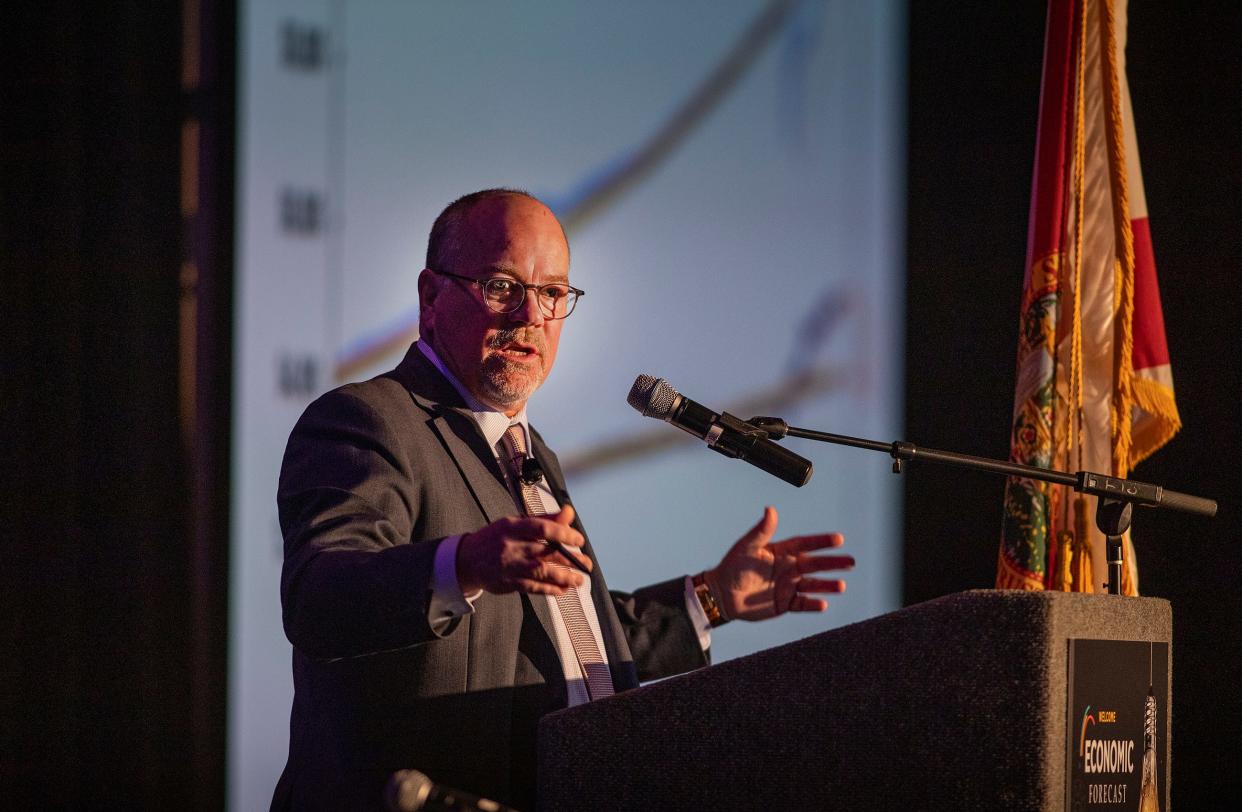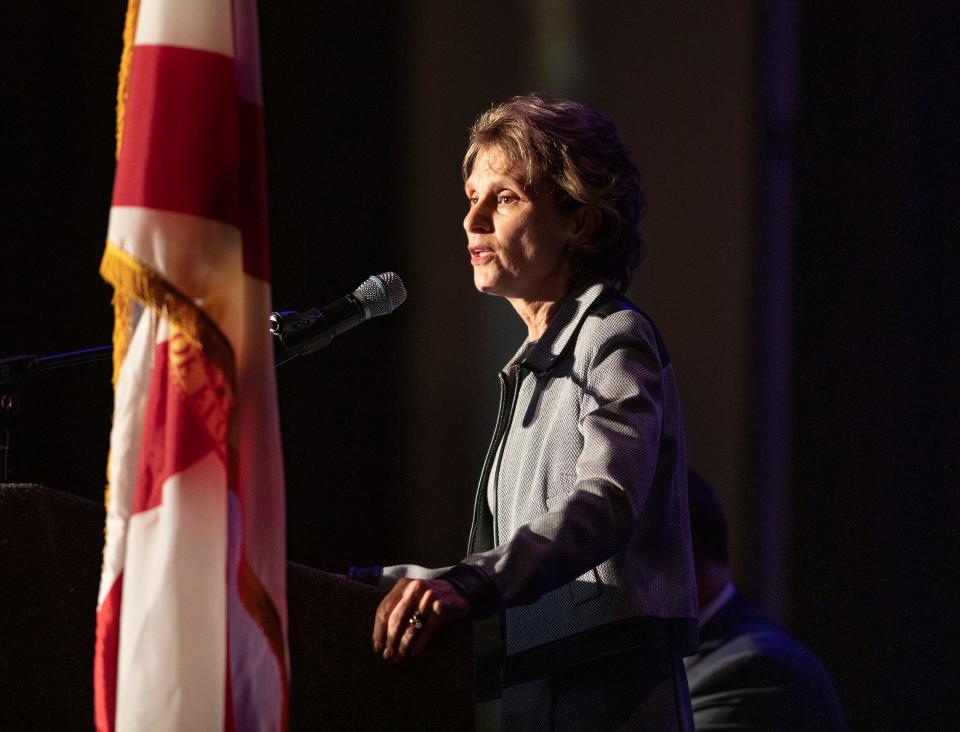'We're about to go bust': Recession predicted during annual Lakeland Chamber event

At the Lakeland Chamber of Commerce’s annual Economic Forecast Breakfast, Thursday, an economist predicted a recession would happen in 2023 as a result of unprecedented economic conditions.
Brian Wesbury, Chief Economist for First Trust Advisors, gave an audience of about 300 attendees from various Polk County industries, including banking, real estate and retail, his thoughts on the current state of the U.S. economy and touched on a few specific topics such as inflation.
Money for education: Polk School Board reviews budget report, ponders spending plan for next year
Business: Chick-fil-A set to open Bartow location in February
His main focus was on the impact of big government spending during the COVID pandemic. A looming recession will be caused by the federal government’s unprecedented printing of too much money during the pandemic, he told the audience at the RP Funding Center.
“When people hear the word unprecedented and they think, well it's been a long time,” Wesbury said. “And I remind them that, no, unprecedented means never have we been in locked down. Never have we printed $4 trillion new dollars and pushed them into the economy in such a short period of time. Never have we borrowed $5.25 trillion from our kids and our grandkids and our great grandkids and handed it out to be spent by people who weren't working.”
Because of these moves by the government, it would be impossible to determine how their actions will play out, but Wesbury said he wanted to explain the aftermath and results of the moves by the federal government.
With the help of a chart he displayed, Wesbury showed Americans engaged in $1.3 trillion more in spending on goods than we would have spent if we had no pandemic.
"Think about that," he said. "We spent $1.3 trillion more than if we had no pandemic and hadn't locked down the economy. How's that possible? Because we borrowed from the future.”

Service workers unemployed during the lockdown spent their COVID relief money on exercise equipment, durable goods, home renovations and cars, which gave rise to the exponential growth of such companies as the exercise bicycle manufacturer Peloton, which Wesbury called his “poster child” for where the COVID aid money went.
"People brought the health club into their homes,” he said.
As the COVID lockdowns eased and health clubs reopened, workers returned to in person workouts and sales plummeted for the company, resulting in out-sourcing of its manufacturing, selling off 20% of the company and its founder losing his job.
Wesbury explained that decades ago the economy was based on manufacturing goods, comprising 70% of the economy and services were just 30% of the economy. Those percentages had flipped long before the pandemic and so because businesses providing in person services were shutdown, the economy suffered during the pandemic.
“You couldn't go to a restaurant,” Wesbury said. “You couldn't go to a movie theater. Broadway plays were shut down and there were no sporting events.”
Wesbury also predicted that because retail sales fell in December, he expected declining sales to continue this year.
“A lot of people thought we would have a recession last year. We didn't," he said. "The reason is goods were slowing down but services were coming back.”
Growth: Bartow expands Wind Meadows development district. Here are how many more homes are coming
As consumers emerged from the pandemic and started buying again, Wesbury did not expect them to not increase their buying levels to make up for missed sales during the pandemic.
“If you kind of look at services, it's almost exactly what happened with employment," Wesbury said. "In February of 2020, we had 152 million people working in the United States. We lost over 20 million jobs.”
Slowly but surely, Wesbury said, over past 12 months the economy went back above where it was.
“In fact, if you look at the average of employment, it was 145 million people so we in effect on average lost seven million jobs per year over the last 30 to 33 months,” he said. “I added all that up and it's 30 billion hours of work that didn't happen and what's kind of fascinating about that to me is that even though we didn't work 30 billion hours we still spent more than we would have spent if COVID never happened.”
How is that possible, Wesbury asked.
"What we did is we're hoping on the production of our kids and grandkids and great grandkids in the future to pay for this consumption today," he said.

Wesbury compared the economy stimulus money during the pandemic to a hospital patient with a broken leg who was given morphine for the pain.
“I believe when that morphine wears off – and it's happening right now – that the pain is going to come back and that's why I believe we will have a recession in 2023,” he said.
“It has nothing to do with the Federal Reserve raising interest rates,” Wesbury added. “It is all because we artificially stimulated our economy during a lockdown. You cannot turn off the U.S. economy, or any economy really, but especially the U.S., like a light switch, and then turn it back on and everything is exactly the same.”
which he referred to as “European-type growth.”
Wesbury said the value of the dollar is lower because during the pandemic the amount of money in the economy rose by 42%. He compared corn and orange crops to the dollar saying if farmers have record harvests the price a farmer can charge per orange goes down and so does the amount of goods that the dollar can buy if the economy is flooded with large amounts of money.
Increasing the interest rate to slow the economy is not the reason for inflation, he added.
Wesbury said he has been bullish in the 15 years he's spoken at the annual event, but this year he was not going to be “Mr. Sunshine” as he is nicknamed.
Change in leadership: Polk County fire chief Smith sworn in, new Winston Creek station unveiled
“We're about to go bust," he said. "When I use that word 'bust' I'm a little cautious because we're not gonna see 2008 again, alright, we're not going to see 1999 − the stock market is not massively overvalued, banks have more liquidity, more capital.”
Wesbury pointed to recent reports of downturns in the housing and automobile industries as evidence there will be a recession in 2023. Further, manufacturing indices are below 50 across the country and small business optimism has fallen.
Government revenues are also lower. He said six months ago California expected $100 billion budget surplus and now they are expecting a $27 billion deficit because they believed what was happening during the pandemic was normal.
In terms of a shrinking economy, Wesbury said a half percent is predicted by many experts, but he forecast the economy would shrink by 2% during the recession.
He also said the debt limit would be raised probably in June or July and technology would lead the economy out if the downturn.
Paul Nutcher can be reached at pnutcher@gannett.com.
This article originally appeared on The Ledger: Recession predicted during annual Lakeland Chamber event

